Implant-Supported Bridges vs Dentures: Which is Better?
People who’ve lost many teeth in functional positions find it difficult to speak, eat, and navigate life confidently. Correcting these problems will require them to pick a side in the dental bridge vs dentures debate. Both highlight how oral health affects life; their functions vary greatly and change lives in different ways.
Anyone requiring a closer assessment of the two can read this for a professional’s opinion.
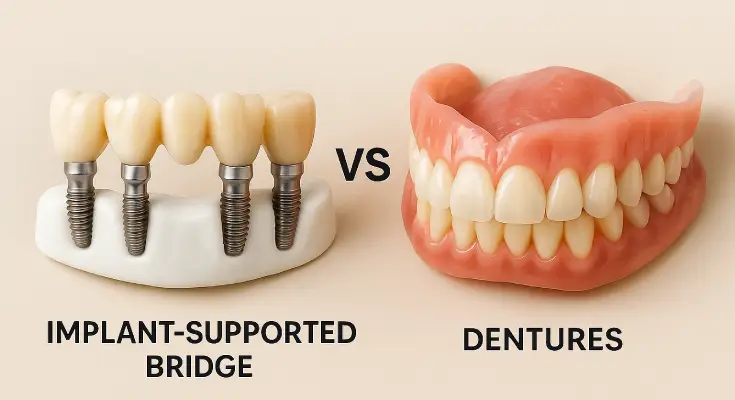
What are Implant-Supported Bridges?
Let’s start our description of an implant-supported bridge by covering a normal dental bridge.
A bridge is an artificial tooth held and positioned by its neighboring teeth. Here, the healthy surrounding teeth are filed down and covered with a crown to facilitate the new false tooth.
It doesn’t involve surgery, but healthy, supportive teeth (abutments) require permanent alteration. Changes to the surrounding teeth can lead to fit issues that alter comfort or usability. If the artificial replacement for the missing tooth loosens, it can create inconvenience and uncertainty.
For implant-supported bridges, the point of difference is the area providing the new teeth with support. Unlike normal bridges, the artificial teeth receive a dental implant for support. The result is an implant-supported bridge that imparts greater stability, comfort, and aesthetic appearance.
When it comes to dental implants, only Zygomatic Dental Implants offer better stability and tooth support.
What are Dentures?
Dentures are fake teeth fashioned in a way that makes them easy to remove or be fixed into the mouth. They are mostly fixed into an artificial gum guard, which rests in the mouth. Dentures come in full arch or select tooth replacements, allowing for full arch or partial dentures.
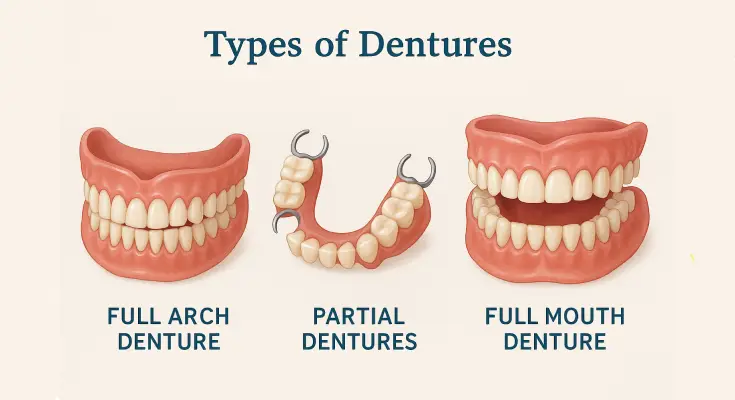
Although possessing unique benefits, dentures never meet the unmatched stability of implant-based fixtures. While dentures are touted as affordable, their appearance is lacking, and adjustments are necessary over time.
Implant-Supported Bridges vs Dentures: How They Differ
The qualities between dentures and an implant-supported bridge can make a significant difference. By assessing both options one at a time based on a specific feature, patients can determine what’s better. Both fall under the category of Cosmetic Dentistry but appeal to different audiences.
To make the differences clearer, here’s a comparison table highlighting how implant-supported bridges and dentures stack up:
| Feature | Implant-Supported Bridge | Dentures |
|---|---|---|
| Comfort & Function | Feels like real teeth, stable | May slip, adjustments needed |
| Appearance | Natural-looking, long-lasting | Less natural, even costly ones |
| Number of Teeth | Best for several missing teeth | Suitable for 1–2 teeth gaps |
| Cost | High upfront, long-term value | Affordable but recurring costs |
| Bone Health | Preserves jawbone density | Doesn’t prevent bone loss |
| Stability | Very stable, implant-backed | Relies on gums, less stable |
| Longevity | Lasts decades/lifetime | Needs replacement 5–8 years |
| Maintenance | Same as natural teeth | Requires daily removal/cleaning |
1. Comfort & Function
While comparing an implant-supported dental bridge vs dentures, comfort and functionality prove essential.
- Supported dental bridges function and feel like real teeth without concerns about shifting or loosening.
- Dentures lack that genuine tooth appeal, and adjustments are mandatory for comfort. There’s the constant hassle of shifting and the chances of them falling out during use.
2. Appearance
Anyone looking to get replacement teeth would be conscious of their appearance. It makes the most natural-looking option a clear winner for people seeking a direct match.
- When it comes to colour and lasting appearance, the implant-backed bridges overtake dentures. Dentures can’t come near the look and feel of teeth. For patients mainly focused on enhancing their smile aesthetics, treatments like veneers vs bonding may also be worth considering.
- Dentures can’t come near the look and feel of teeth, nor can the expensive ones!
3. Number of Missing Teeth
Considering the number of teeth that need replacing, dentists will suggest the ideal option.
- An implant-supported bridge is the preferred choice for people missing considerable teeth.
- If one or two teeth need to be replaced, a denture can suffice, but it will require exceptional sizing for comfort.
4. Cost
When comparing a dental bridge vs dentures, cost will be a consideration in the debate. Patients must view this with a long-term perspective to understand the overall value.
- The invasive implant-supported dental bridge is costly upfront, but it’s undoubtedly an investment.
- Dentures can be availed for a nominal cost, but adjustment costs and changes can mount.
5. Bone Health
Dental patients would undoubtedly want to choose a dental option that provides jawbone longevity.
- Implants help preserve jawbone density, benefiting people with minimal density.
- Dentures do nothing to help jawbone depletion, and the issues will continue to eat away at the remaining bone.
6. Stability
Enhanced stability of the false teeth will give the patient confidence and will also deliver better functionality.
- Based on the name, the implant-supported dental bridge offers unequaled stability. Dentures can’t deliver such a level of stability to their wearers.
- Dentures depend solely on the gums for support, proving painful with prolonged use.
7. Longevity/Durability
People don’t just want a quick solution, as they also want a long-term solution. So, the durability of the dental appliance carries immense weight in their decisions.
- Implant-supported dental bridges offer exceptional longevity! It may need a change after decades, but with optimal care, it can last a lifetime.
- Dentures aren’t as long-lived and will need replacement every 5 to 8 years for comfort and durability.
8. Maintenance
Post-procedure care will also play a role in deciding the winner of the dental bridge vs dentures debate.
Since they are non-removable, the care routine involves brushing and flossing, just like natural teeth. For more detailed guidance, check out our complete guide on dental implant care.
- An extra layer of care is needed for dentures, which are mostly removable. Daily cleaning is necessary to ensure optimal hygiene and to prevent fitting hindrances.
9. Ideal Candidate
Both appliances are best suited to a specialized list of people with specific missing teeth problems.
- This invasive option is best for anyone seeking a permanent and close-to-natural solution.
- Patients wanting an economical and non-surgical alternative can opt for dentures.
When to Choose Implant-Supported Bridges?
There are instances when the dental bridge vs dentures debate can be put to rest quickly. People suffering from tooth loss would choose this over dentures, even the affixed ones. The numerous reasons why patients choose this invasive option over non-invasive ones are:
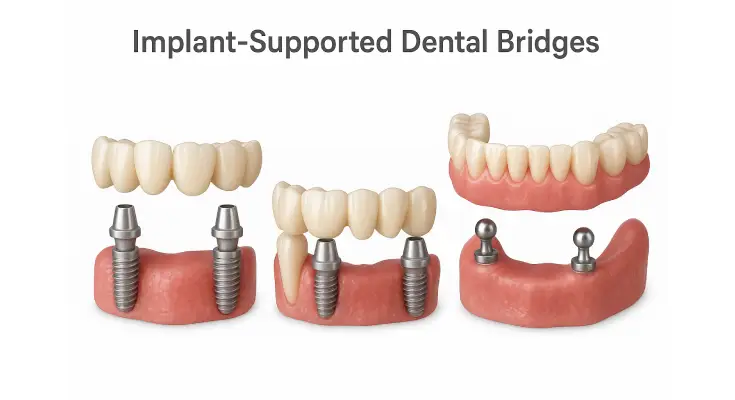
Several Lost Teeth
Bridges, specifically implant-supported bridges, are employed when patients have lost several teeth. The option for a full arch bridge makes this a convenient option for people with severe tooth loss. This fixed option overcomes the worry about dentures falling out or loosening.
Jawbone Density Recovery
People suffering from depleting jawbone density can consider this implant-backed option for recovery. This procedure helps to preserve jawbone density instead of depleting it further. Maintaining a healthy jawbone volume is crucial to preventing more dental issues later on.
Long-Lasting Stability
The presence of implants embedded into bone makes implant-supported bridges extremely stable. It ensures that patients don’t suffer issues with looseness, pain, or instability long after this procedure.
Fixed Dentures Prove Inefficient
Long-term dentures are permanently placed in the mouth with chemical adhesives. This is messy, and no adhesive offers stable lifelong placement without issues. This is where options like implant-based bridges excel for people who’ve tried every other option.
When to Choose Dentures?
Dentures are the ideal dental option for people of all ages and budgets! They make the obvious choice for people who don’t want to pursue invasive solutions. See the other reasons why dentures are more prominent than you think.
Accommodates All Financial Groups
While other dental interventions for missing teeth prove costly, dentures are affordable enough to consider. Even if adding customizations, they are a cost-efficient solution, irrespective of budget constraints.
Minimal Teeth to Replace
From a cost and invasiveness perspective, it seems illogical to replace one tooth using an implant-supported bridge. A denture can help replace two teeth using a single denture! It’s the preferred decision when there aren’t many teeth to replace.
Surgical-Free Option
Anyone who fears surgical intervention can opt for pain-free artificial teeth. The measuring and fitting process doesn’t involve surgery or pain and is completed in a few visits.
Temporary Solution
People seeking quick and temporary dental procedures can find immediate solace in dentures. These removal implants are conveniently portable and won’t interfere with future dental work plans. Their removability allows for timely cleaning and comfort at night.
Also Read
Conclusion
The dental bridge vs dentures debate ends with two clear groups being drawn. One side has people seeking stable, long-lasting, authentic-feeling appliances to close multiple gaps. The other has people looking for cost-efficient, temporary dentures to close a gap or two. Depending on where your priorities lie, it’s clear which group would suit your needs.
FAQs
1. How are dentures and implant-supported bridges different?
The biggest point of variance between the two is that implant-supported bridges are invasive, long-lived, and costly. Dentures are the opposite, being non-invasive, short-lived, and affordable.
2. Which lasts longer in the debate of a dental bridge vs dentures?
When the question of durability comes up, the former wins the debate, hands down! Dental bridges last for decades, while dentures need adjusting or replacing in 5 years or more.
3. Which dental procedure is more affordable and worthwhile?
While a denture costs less, it isn’t specifically the best option. From a long-term outlook, dental implants lead to a better future. Dental bridges are a long-lasting investment and don’t drastically change the quality of life.
4. How long will it take for invasive implant-supported bridges to heal?
The initial healing of the soft tissues takes one or two weeks. Three to six months are needed for osseointegration or bone healing.
5. Can older people opt for an implant-supported bridge?
Yes, since the procedure relies on jawbone density, not age, even older people can opt for it. It allows older individuals a chance to regain their smile and oral functionality.

Dr. Alexander Heifitz (Author)
Dr. Alexander Heifitz is the founder of 65 Broadway Dental in NYC, where he combines advanced dental expertise with a patient-first approach. He specializes in cosmetic and restorative treatments such as dental implants, veneers, Invisalign, and smile makeovers, helping New Yorkers achieve both oral health and confidence.
Booking An Appointment
Looking for a reliable dentist in Downtown NYC? Whether you need a routine cleaning, urgent care, or a full smile transformation — we’ve got you covered. We accept most PPO insurance plans and offer flexible scheduling.
+1 (212) 430-3888
Call for appointment
Walk-ins Welcome / Same-Day Appointments Available

Related Blogs
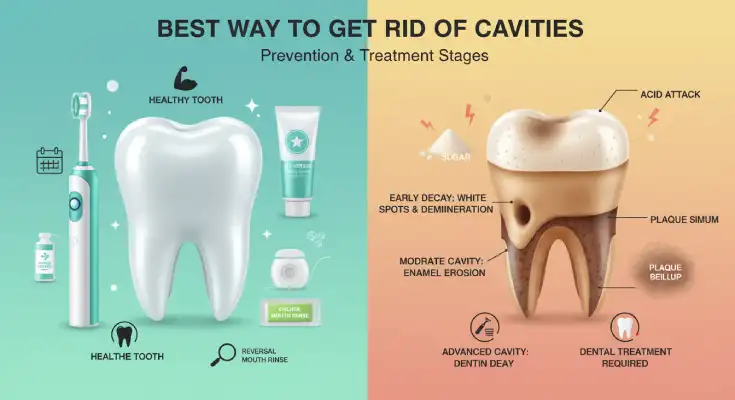
The Best Way to Get Rid of Cavities: What Actually Works (Backed by Science)
Discover the best way to get rid of cavities with proven science-backed methods, daily care tips, and dentist-recommended strategies.
Read More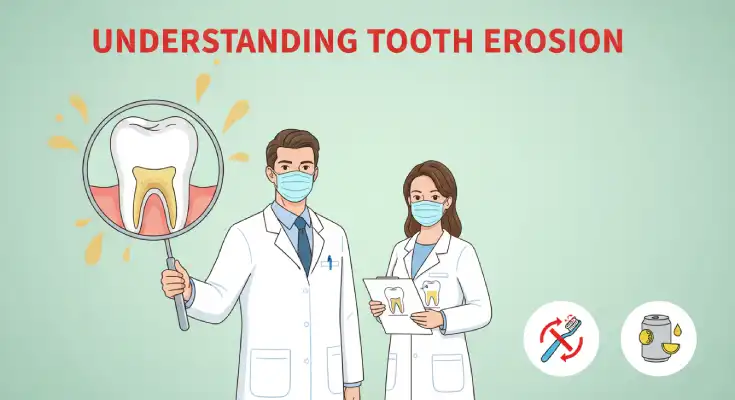
Tooth Erosion at the Gum Line: Causes, Treatment & Prevention
Learn what causes tooth erosion at the gum line, how dentists treat it, and simple ways to protect your enamel from further damage.
Read More